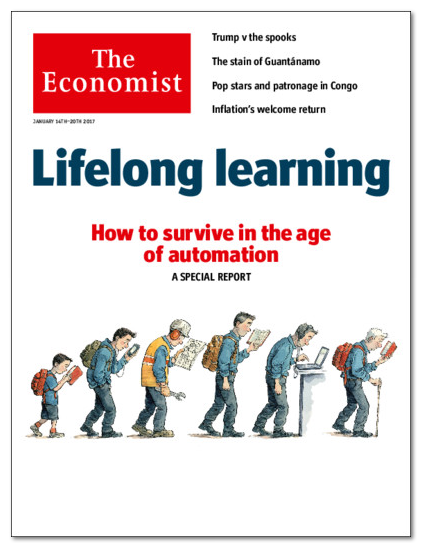Experts Agree that Ongoing Education is the Key to Career Success

How Will You Battle the Bots?
With the rapid pace of technological and societal change, it is no longer sufficient to rely purely on formal education and college degrees when seeking employment.
We need to continue learning all the time as we adapt to the changing conditions related to our jobs and careers, and business markets in general.
According to a recent article published by The Economist:
Technological change demands stronger and more continuous connections between education and employment. – The Economist
 Many people are concerned about the advancement of robotics and automation that appears to be replacing jobs, especially in the manufacturing space; a recent study by MIT noted that for every robot brought online, an average of 6 human jobs are lost.
Many people are concerned about the advancement of robotics and automation that appears to be replacing jobs, especially in the manufacturing space; a recent study by MIT noted that for every robot brought online, an average of 6 human jobs are lost.
The industrial revolution has now been replaced by the information revolution and the knowledge economy, and the jobs of the future will change to reflect this. Not only will current positions change materially -- they'll be less repetitive and dangerous, be centered around technology and innovation, often be more creative, and possibly more challenging and rewarding -- but new opportunities will arise.
So how do you prepare for this sea-change?
The answer is education, ongoing education that continues over the course of your entire career. By keeping up with the professional and technological trends in your industry, you'll learn which skills and knowledge are necessary to compete in a changing economy.
A college degree at the start of a working career does not answer the need for the continuous acquisition of new skills, especially as career spans are lengthening. Vocational training is good at giving people job-specific skills, but those, too, will need to be updated over and over again during a career lasting decades. – The Economist
Many successful people understand how important it is to continuously learn throughout their career. In fact, some people spend most of their time learning. Billionaire investor Warren Buffet reportedly spends nearly 80% of his days reading, gaining new knowledge that he then applies to his business decisions.
The internet has increased our ability to access a vast amount of information at our convenience, and self-motivated learners can often find resources that will help them along their path. While that's a wonderful way to initially explore a topic, delving in deeper to learn more and build useful skills often requires the guidance of an expert.
Job skills classes, workshops and certificate programs are great ways to expand your skills. With companies now spending less money on training and professional development, it's important that you develop your own strategy for continuous learning.
According to the Pew survey, 54% of all working Americans think it will be essential to develop new skills throughout their working lives; among adults under 30 the number goes up to 61%. Another survey, conducted by Manpower in 2016, found that 93% of millennials were willing to spend their own money on further training. – The Economist
Fortunately, it doesn’t take have to take a lot of time or money to boost your skills and make yourself more marketable. The first step is developing a long-term strategy that will ensure your skills are always up-to-date.
Focusing on enhancing skills specific to your job is always a good idea, but diversifying is a great way to provide more value to your employer and expand your available employment options. For example, if you're not in a technical job, knowing more about basic technology and social media will help you collaborate better with others who do work in those fields. Similarly, graphic design and photography skills can add a new dimension or way of thinking if you're creating software. And skills such as project management, team leadership, or conflict resolution will improve your ability to work cross-functionally and within your dedicated team.
While the best way to future-proof your career is to develop your knowledge and skills to a level that a bot can't even compete, the benefits of lifelong learning will reverberate throughout your life. After all, knowledge is power -- and knowing is half the battle.
Never stop learning!
This article was written in collaboration with our partner, Connect2Classes.